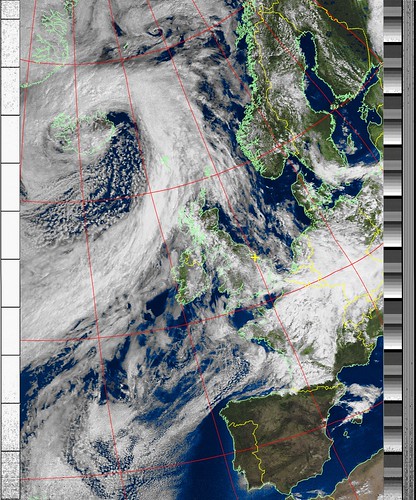 |
| NOAA 18 11.30 a.m. |
Thursday, 16 July 2020
Tuesday, 14 July 2020
Weather Satellites
There are many satellites keeping an eye on the weather systems around the world. There are three NOAA satellites I can receive the picture information from. These are polar orbiting satellites circling the Earth N to S or S to N depending which orbit they are on. Also they move a bit from E to W on each orbit so the whole world can be covered. Each polar orbit takes about 1hr 40min.
From this mornings passes of NOAA 19 near the UK.
First pass to the East of us:

the next pass to the West of us
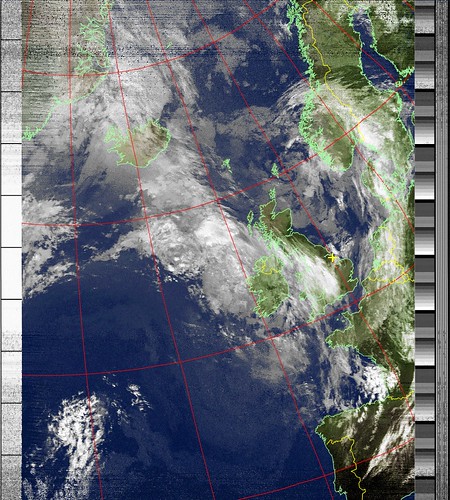
It takes approximately 12 minutes for each picture to be received as they are built up in horizontal lines as the satellite moves round the globe. The yellow cross marks the position of my ground station which is receiving the pictures.
If you are interested in receiving these weather pictures yourself then have a read through 'DIY Satellite Ground Station' HERE for information on how to get started on Windows or MacOS computers.
From this mornings passes of NOAA 19 near the UK.
First pass to the East of us:

the next pass to the West of us

It takes approximately 12 minutes for each picture to be received as they are built up in horizontal lines as the satellite moves round the globe. The yellow cross marks the position of my ground station which is receiving the pictures.
If you are interested in receiving these weather pictures yourself then have a read through 'DIY Satellite Ground Station' HERE for information on how to get started on Windows or MacOS computers.
Monday, 13 July 2020
Monday Mystery
Last weeks close up

was correctly identified as part of

a chimney pot.
Well done to the Veg Artist, Thelma, Adrian, Dave, Ragged Robin and Ellen D.
I had that top vent installed some years ago after a Starling fell down and got trapped behind my gas fire.
Indoors this time for the new close shot

of what?
Please leave any guesses in the comments.
They will be revealed, along with the answer, next Monday.

was correctly identified as part of

a chimney pot.
Well done to the Veg Artist, Thelma, Adrian, Dave, Ragged Robin and Ellen D.
I had that top vent installed some years ago after a Starling fell down and got trapped behind my gas fire.
Indoors this time for the new close shot

of what?
Please leave any guesses in the comments.
They will be revealed, along with the answer, next Monday.
Sunday, 12 July 2020
Receiving Weather Satellite Pictures
Many years ago I built a kit receiver for capturing the pictures from polar orbiting weather satellites. Unfortunately it is no longer supported and can't receive the signals from the latest satellites. A few days ago I spotted an article written by two young lady amateur radio enthusiasts detailing how to use an SDR (software defined radio) to do the job. It can be found HERE.
This is the SDR

a receiver in a USB dongle which is controlled and tuned by software on a computer. The above mentioned article gives very clear, detailed instructions how to set things up on a Windows or Mac computer. I downloaded and installed everything needed for my MacBook.
The other thing required of course is an aerial. Several types are discussed in the article.
Fortunately I still had the aerial I built years ago.
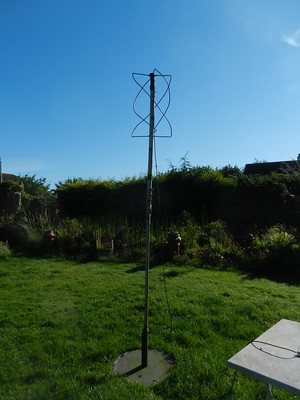
This is the most complicated type to build and gives excellent reception.
There are three programs running on the computer.
One to control the SDR and tune it to the satellite signal.

One to decode the signal and build up the pictures.

The third is a hidden program used to channel the sound from the receiver to the map processor.
Received pictures look like this

in fact two pictures side by side, one normal light and the other IR.
Once they have been received the software processes them together, adds false colour and country outlines to produce different combinations:
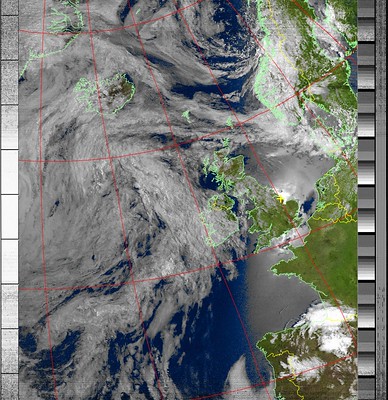

Those are pictures I received this morning.
This has been a quick outline of what I did. If you fancy having a go do look at the article mention at the start of this post.
This is the SDR

a receiver in a USB dongle which is controlled and tuned by software on a computer. The above mentioned article gives very clear, detailed instructions how to set things up on a Windows or Mac computer. I downloaded and installed everything needed for my MacBook.
The other thing required of course is an aerial. Several types are discussed in the article.
Fortunately I still had the aerial I built years ago.

This is the most complicated type to build and gives excellent reception.
There are three programs running on the computer.
One to control the SDR and tune it to the satellite signal.

One to decode the signal and build up the pictures.

The third is a hidden program used to channel the sound from the receiver to the map processor.
Received pictures look like this

in fact two pictures side by side, one normal light and the other IR.
Once they have been received the software processes them together, adds false colour and country outlines to produce different combinations:


Those are pictures I received this morning.
This has been a quick outline of what I did. If you fancy having a go do look at the article mention at the start of this post.
Labels:
SDR,
weather,
weather picture,
weather satellite
Tuesday, 7 July 2020
Bumble Bees Love Lavender
My two lavender bushes are host to dozens of bumble bees at the moment
They are also starting to attract small tortoiseshell butterflies.
They are also starting to attract small tortoiseshell butterflies.
Monday, 6 July 2020
Monday Mystery
Last week's close view
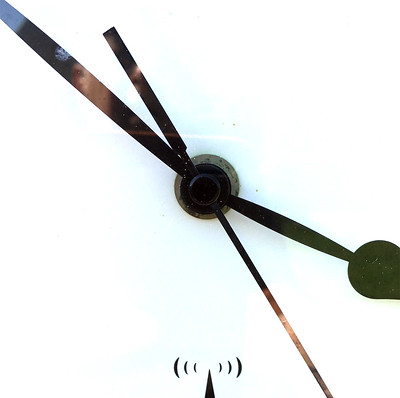
didn't cause any problems.
Congratulations to Adrian, the Veg Artist, the Weaver of Grass, Kev, Ellen, Kris, Bettina and Dave who all saw it was

the hands on a clock face. Adrian and Kev also noticed the symbol for radio control.
This may be a little harder

a close view of ..... what?
As always, please leave any guesses in the comments.
They will be revealed, along with the answer, next Monday.

didn't cause any problems.
Congratulations to Adrian, the Veg Artist, the Weaver of Grass, Kev, Ellen, Kris, Bettina and Dave who all saw it was

the hands on a clock face. Adrian and Kev also noticed the symbol for radio control.
This may be a little harder

a close view of ..... what?
As always, please leave any guesses in the comments.
They will be revealed, along with the answer, next Monday.
Thursday, 2 July 2020
Subscribe to:
Posts (Atom)
